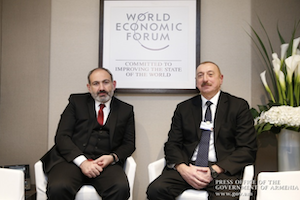Armenia's Approach to Conflict Settlement Leads to Deadlock
By Ilgar Gurbanov
June 27, 2019, the CACI Analyst
The regime change in Armenia revived hopes in Azerbaijan that the new Armenian government would take a more proactive approach to the frozen settlement process of the Nagorno-Karabakh conflict. The latest meeting of Azerbaijan’s and Armenia’s leaders in Vienna promised humanitarian cooperation, yet the short-term silence on the frontline was soon broken by new ceasefire violations and counter-productive statements from the Armenian government. From Azerbaijan’s perspective, the building of trust required for a reinvigoration of the peace process requires steps such as the withdrawal of Armenian occupying forces from Azerbaijan’s territories, with a subsequent return of IDPs. Armenia’s overreliance on the status-quo creates systemic problems for the negotiations.

Azerbaijani journalist released
By Almaz Rza
June 8th, the CACI Analyst
“Greetings! I am out of prison! Thank you all for your support! I am strong and full of energy. I will continue my work as a journalist,” Khadija Ismayilova posted on her Facebook page right after she was released from custody. On May 25, Azerbaijan’s Supreme Court ordered the investigative journalist released after changing her prison term from 7 1/2 years in custody to a suspended term of 3 1/2 years.
Armenia and the EU launch a third round of negotiations
By Erik Davtyan
June 13th, the CACI Analyst
On May 12, a new round of talks on the new legal framework between Armenia and the European Union kicked off in Yerevan. The delegations, headed by Armenia’s Deputy Foreign Minister Garen Nazarian and Dirk Schuebel, Head of Division for bilateral relations with the Eastern Partnership countries in the European External Action Service, discussed the provisions of the chapters pertaining to political dialogue, reforms, and cooperation in the fields of justice and freedoms.
The Nagorno-Karabakh conflict at the center of Russia-Armenia relations
By Erik Davtyan
May 13th, the CACI Analyst
The unprecedented escalation of the Nagorno-Karabakh conflict on April 2-5 is the topic of a process of intense discussions between Russian and Armenian authorities. After the Chiefs of Staff of Armenia’s and Azerbaijan’s armed forces, Yuri Khachaturov and Najmaddin Sadigov, reached an oral ceasefire agreement in Moscow, Russia immediately activated its policy toward the conflict, including several high-level visits to Yerevan and Baku for discussions with the respective authorities.
Nagorno-Karabakh and the military balance
By Tomáš Baranec and Beskid Juraj
May 10th, 2016, The CACI Analyst
A new wave of escalation hit Nagorno-Karabakh in early April. In the course of what was probably Azerbaijani reconnaissance by force, claiming dozens of dead on both sides, Baku managed to secure several heights controlled by Armenian forces. Immediate hostilities have receded for now, but the question remains how the military strength of both sides has changed in recent years, what this means for the future of the peace process, and the role of Russian arms in the resurrection of this conflict.
.






